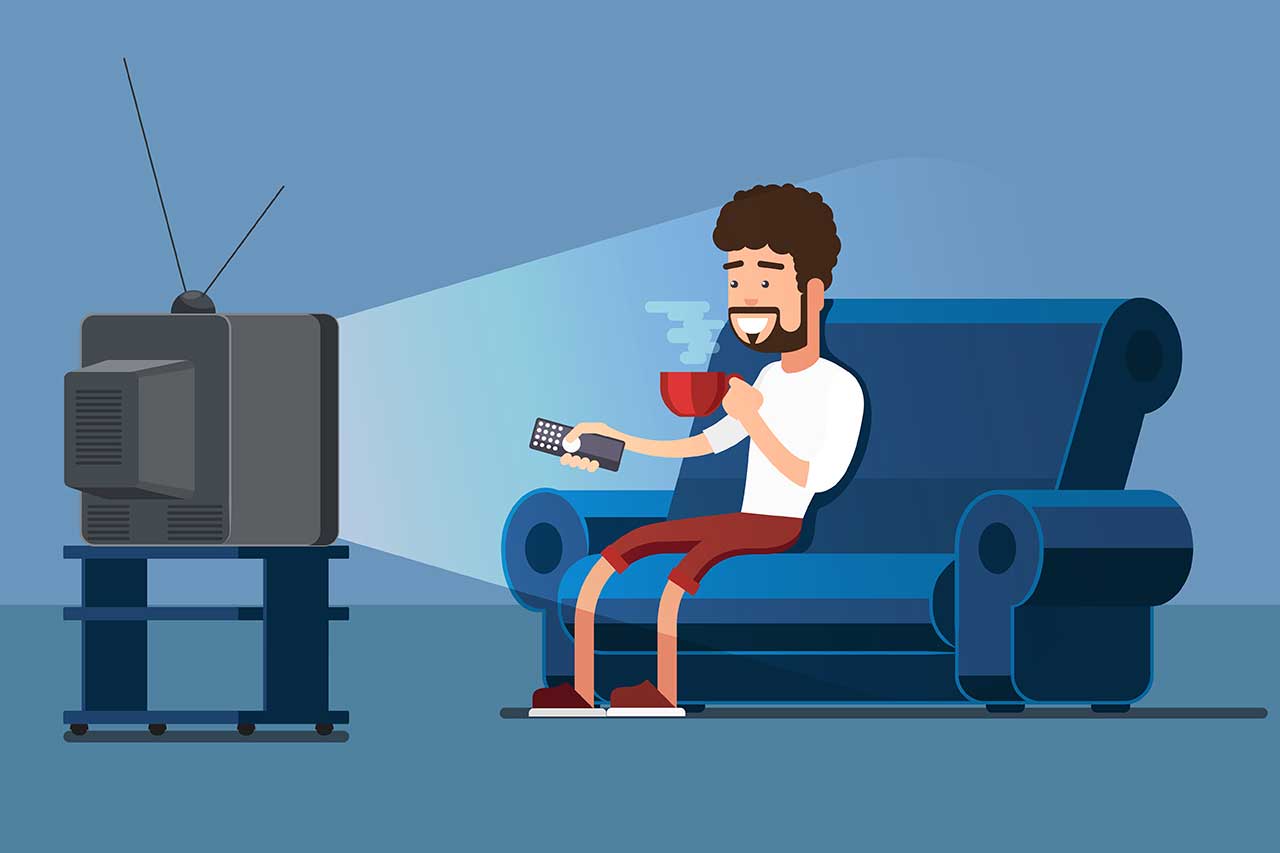Since the start of the pandemic the motto has been ‘stay at home’, home entertainment and the popular streaming services Netflix, Amazon Prime Video, Hulu and the like have experienced an enormous boom. However, anyone who takes a seat on the couch after work and watches episode after episode of their favorite series is exposing themselves to a long-term health risk.
Since Netflix, Prime Video and Hulu have been streaming your favorite series and movies easier than ever, binge watching has become a widespread phenomenon. This involves watching TV for hours, sometimes uninterrupted. It makes sense that this cannot be healthy in the long run. But what exactly makes binge watching a serious risk to health? And how do you prevent the negative consequences of mass TV consumption?
This Is How Binge Watching Makes You Permanently Sick
The unhealthy thing about binge watching is basically that you neglect all the other activities that make up a healthy, active lifestyle – like exercise, sports, and even cooking and social interaction. However, there are also other risk factors.
1. Lack Of Exercise
The obvious disadvantage of watching TV for hours is that you are inactive while doing it. You sit or lie down, moving little or not at all. This inactivity has negative effects on your health in the long run.
You have a lower energy consumption and will lose muscle mass in the long run. But that’s not all. A long-term lack of physical activity will negatively affect your immune system, metabolism, blood circulation, and even your bone structure.
A 2019 study categorized binge-watching into different categories based on the number of hours spent watching TV, and looked at 3592 subjects to see what effects time spent in front of the TV can have. This found that people who watch more than four hours of TV a day have a 50 percent higher risk of developing cardiovascular disease – such as a heart attack or stroke – than those who watch less than two hours a day.
However, with enough exercise and physical activity (at least 150 minutes a week), it is possible to reduce the risk to the same level as watching less than two hours a day.
For those who are now wondering whether sedentary work, such as working at a computer, has a similar negative effect on health can rest easy. Studies found that active sitting (such as working at a desk) and inactive sitting do not appear to have the same effects.
Active sitting, on the contrary to inactive sitting, has no positive correlation with body weight, body fat percentage and cholesterol levels, according to a 2020 study.
2. Poor Diet & Uncontrolled Snacking
Eating behavior during binge-watching also poses a health problem. Crucially, while watching TV, one eats regardless of hunger and feelings of fullness. So instead of eating out of hunger, people eat out of boredom, as a 2014 study shows.
For many, snacking is part of watching TV. The onset of satiety is not directly perceived due to the distraction. This quickly leads to the fact that one takes up more calories than needed.
In addition, the choice usually falls on unhealthy snacks. Healthy and balanced meals that are more time-consuming to prepare would ultimately take up time that would rather be spent watching TV. Ready-made snacks are therefore far more popular with binge watchers.
3. Changes In Metabolism
The lack of physical activity and the unhealthy diet are already two factors that can lead to weight gain and, in the long run, to obesity. However, watching hours of television brings with it other risks that can lead to weight gain.
A study of nearly 44,000 U.S. women demonstrated that hours of television viewing, practiced in the late evening hours and into the night, has been shown to be associated with weight gain averaging 11 pounds over five years.
In addition, individuals who fall asleep with the TV on are 30 percent more likely to become overweight. These results are independent of the influence of unhealthy eating behaviors and lack of exercise.
The correlations can be attributed to the effects that binge watching has on the internal clock and thus on numerous metabolic processes. Especially watching TV late at night has an effect on the internal clock. It is thought to disrupt hormonal balance, affecting appetite, among other things.
4. Lack Of Sleep
Difficulty falling asleep and sleeping through the night are the direct consequence of evening binge watching. Sleep disturbance results, as some may believe, not only from exciting and upsetting television content, but also independent of the content.
The blue light of the television is largely to blame. This leads to increased alertness, stimulates cognitive functions and suppresses the release of the sleep hormone melatonin. Incidentally, other screens such as the smartphone, laptop or tablet screen have similar effects.
In general, it is far more important to sleep in the dark than most assume, according to Dr. Phyllis Zee, an expert in the field. She therefore recommends that the lighting and other light influences (for example, by electronic devices) should be limited in the evening.
5. Poor Social Life
People who prefer to spend their free time alone on the couch watching series always end up in social isolation during that time. The fact that the lack of interpersonal interaction affects mental health is currently highlighted by effects of the Corona pandemic. Binge watching, however, is a self-chosen isolation.
Several studies were evaluated at the University of Leipzig regarding the negative effects of social isolation. The verifiable negative consequences for psychosocial health include “increased depression, anxiety, post-traumatic stress, anger, stressful experiences and loneliness”.
6. Addiction
As with a gambling addiction, binge watching could target specific brain regions and trigger an addiction.
The problem here is not just admitting to addiction, but recognizing it. As soon as other activities and obligations are neglected in favor of TV consumption, experts speak of a behavioral addiction.
The consequences of a television addiction then amount in doubt to all points mentioned so far, thus lack of movement, unhealthy eating behavior, lack of sleep and social isolation.
Such a television addiction thus also represents an immense health risk.
What You Can Do To Prevent Negative Consequences
Do you like to curl up on the couch and watch several episodes of your favorite show in a row?
Especially when the weather is bad or simply because it’s Lockdown, many people feel this way. As long as this doesn’t become a habit, it’s perfectly fine and won’t ruin your health.
To make your binge watching a little healthier, you can follow these tips.
1. Make Binge Watching An Event
With binge watching, frequency is much more important than duration. So don’t let binge-watching after work become an evening routine. But there’s nothing wrong with a series marathon on a rainy Sunday. Make it an event, and know that you’ll only do it once in a while.
2. Set A Time Frame
To make sure that binge watching doesn’t interfere with your commitments and other activities, set a time frame for when you’ll watch series, and then actually stop. This applies especially to the evening. Leave enough time between TV hours and your bedtime to avoid disrupting melatonin production. Instead of watching TV, just read a book.
3. Plan Exercise Around It
Plan a long walk or workout before or after your TV time so you get enough exercise that day, despite being inactive for a long time.
4. Prepare Healthy Snacks And Meals
To avoid the temptation of ripping open a bag of chips for convenience when you’re hungry or popping a ready-made meal in the oven when it’s time for dinner, plan and prepare healthy snacks and meals.
5. Binging In Company
If possible, watch a show or movie with a family member or friend. This will keep you from isolating yourself and is more fun anyway.













